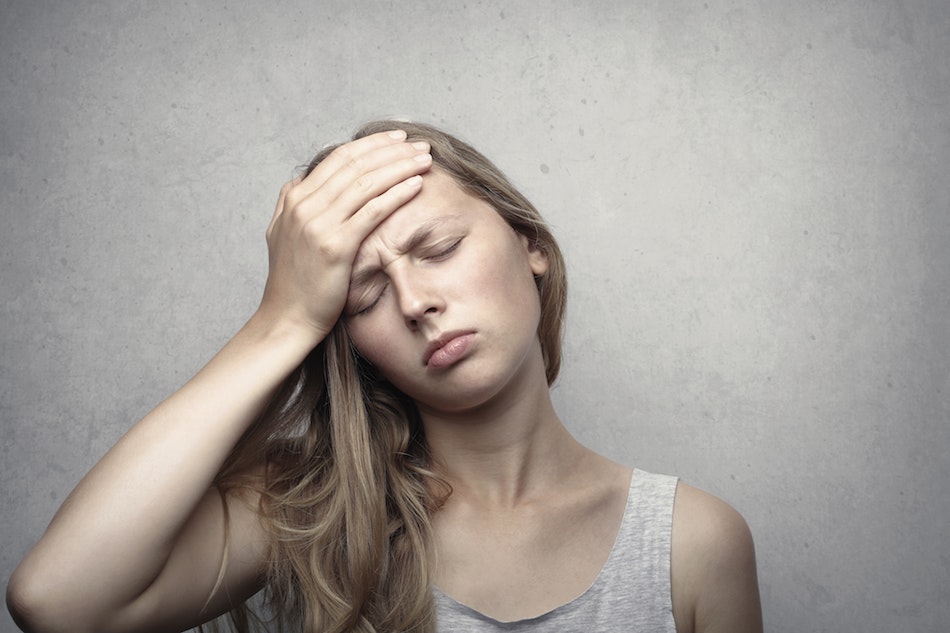PMS - What is Premenstrual Syndrome?
PMS is a very common phenomenon among women, with statistics showing that up to 80% of them experience at least one symptom typical of premenstrual tension (e.g., headaches, breast pain, irritability, bloating, or increased appetite).
If premenstrual tension symptoms are severe enough to interfere with daily functioning, have a very negative impact on mood and self-esteem, and the pain is so intense that it prevents daily tasks, this may indicate Premenstrual Dysphoric Disorder (PMDD). PMDD is a severe form of premenstrual tension that requires medical consultation. Fortunately, it affects only a small number of women, about 3-8%.Causes of PMS - Where do all these premenstrual symptoms come from?
Additionally, premenstrual syndrome may be the result of changes in the concentration of neurotransmitters in the brain, important chemical substances. One of them is serotonin, which insufficient level may affect the intensity of PMS symptoms. Low serotonin levels can cause mood swings, even depressive states, fatigue, and sleep disturbances.

PMS Symptoms - The most common premenstrual tension symptoms
Basing on the analysis of menstrual cycles of OvuFriend users, the most common PMS symptoms include:
- Mood swings / mood swings,
- Crying / nervousness / anxiety,
- Painful / sensitive / tender breasts,
- Acne,
- Headache,
- Digestive problems e.g., bloating / constipation / diarrhea,
- Sleep problems,
- Changes in libido,
- Changes in appetite / cravings,
- Weight gain / water retention in the body,
- Fatigue / drowsiness / concentration problems,
- Abdominal pain / cramps,
- Swelling (e.g., feet).
When can PMS symptoms worsen?
There are factors that do not cause but can exacerbate premenstrual tension syndrome. These include:
- Sedentary lifestyle,
- Smoking and excessive alcohol consumption,
- Stressful lifestyle,
- Diet rich in unhealthy fats, sweet and salty snacks, large amounts of salt and sugar, as well as excessive consumption of red meat,
- Depression.
For most women, PMS does not greatly affect their daily functioning. For some women, the only symptom may be increased appetite and cravings for chocolate in the days leading up to their period. However, for about 20-30% of women, the intensity of PMS symptoms is assessed as moderate or severe. If the course is severe, we then refer to it as Premenstrual Dysphoric Disorder (PMDD). PMDD can affect both physical symptoms (e.g., pain) and emotional symptoms (e.g., depressive states). One thing is certain - in the case of PMDD, the symptoms affect daily functioning, exclude the woman from life, make it difficult for her to socialize, and make it difficult for her to perform duties, which can affect her performance at work. In such a situation, medical consultation is recommended.
PMS - Diagnosis and Treatment
The diagnosis of PMS is based primarily on a detailed medical interview with the patient about accompanying symptoms. It is then good to present menstrual cycles and symptoms recorded in the application (from at least 2-3 menstrual cycles). This will allow the doctor to familiarize themselves with the symptoms, accompanying ailments, and at the same time indicate which symptoms are repetitive and most troublesome.
The doctor may also order basic tests, as symptoms in some conditions may mimic those experienced during premenstrual tension. What conditions are we talking about? Primarily thyroid disorders, chronic fatigue syndrome, irritable bowel syndrome, or depression. It is the doctor's task to exclude other disease entities.PMS - What brings relief? How to alleviate symptoms?
- Limit salt and sugar. Excess salt can cause water retention in the body and thus swelling. Sweet and salty, unhealthy snacks can exacerbate skin problems such as acne.
- Eat smaller meals. A light diet, smaller but more frequent meals can be helpful for bloating and constipation.
- Limit alcohol and caffeine. Before menstruation, it is worth reducing alcohol, coffee, or strong tea intake. They can flush out many valuable nutrients from the body, e.g., magnesium. Magnesium deficiency primarily increases menstrual pain.
- Choose whole grain products. They are rich in B vitamins, which can be helpful for characteristic PMS symptoms: sensitive breasts, water retention, and even mood swings.
- Be active. Physical exercise can alleviate the pain symptoms experienced with PMS (e.g., painful cramps before and during menstruation). Additionally, they cause endorphins, the so-called hormones of happiness, to be released in the body. This is particularly important for women who suffer from low mood, nervousness, and depression before menstruation.
- Limit stress. Relaxation, relaxation, and rest can make PMS symptoms less troublesome. It is worth practicing yoga or meditation, learning relaxation methods that will be a great antidote to headaches, fatigue, or sleep problems.
Medications to help with PMS
- Supplements - it's worth doing tests and talking to your doctor about possible supplementation. For example, magnesium, vit. B6, vit. E can work to alleviate PMS symptoms, e.g. they can relieve menstrual pain.
- Pain medications - over-the-counter nonsteroidal anti-inflammatory drugs (NSAIDs) that relieve painful conditions, e.g. breast pain, or the characteristic pain felt before menstruation and in the first days of bleeding (read more: painful periods - the most common causes),
- Diuretics - a doctor may prescribe diuretics if a woman has a major problem with water retention in the body, and consequently with increased body weight, bloating and edema.
- Birth control pills - hormonal pills have an inhibitory effect on ovulation and thus can significantly reduce the discomfort experienced before menstruation. Of course, this is not an option for women who are trying to have a baby.
- Antidepressants - used in extreme cases, primarily in PMDD, a severe form of premenstrual syndrome. In particular, if the emotional complaints are very severe - lowered mood, depressive states, anxiety. Antidepressants are mainly selective serotonin reuptake inhibitors (SSRIs), which reduce mood swings, improve overall mood and functioning.
Your doctor may recommend using the drugs only during the second half of your menstrual cycle, for example.
